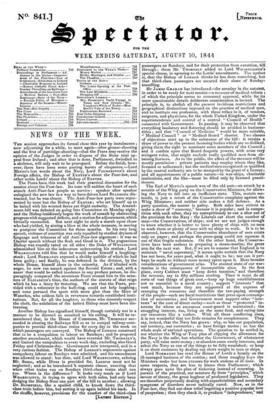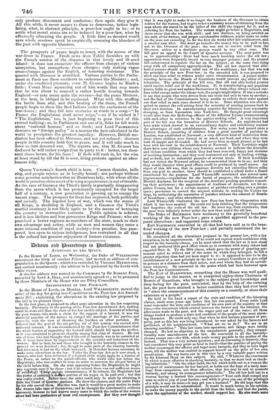NEWS OF THE WEEK.
"Tits session approaches its formal close this year by instalments ; now adjourning for a while, to meet again—after grouse-shooting and the first of partridge-shooting—that the Peers may receive the .opinion of the Judges in order to dispose of the State trial appeal from Ireland ; and after that is done, Parliament, dwindled to a skeleton, will only wait to be prorogued. Before the finish, however, there have been some parting bursts of eloquence,—Lord MINTO'S last words about the Navy, Lord PALMERSTON'S about Foreign affairs, the Bishop of EXETER'S about the Poor-law, and other noble Lords' about the Bishop of EXETER. The Peers have this week had their practical discussion for the session about the Poor-law. Its tone will sadden the heart of such stanch Anti-Poor-law people as survive : speaker after speaker eulogized the new law in a way to have driven Lord STANHOPE distracted, but he was absent. The Anti-Poor-law party were represented by none but the Bishop of EXETER; who set himself up to be baited with his wonted fierce yet frigid audacity. The Amendment-bill was debated on going into Committee on Monday night ; and the Bishop insidiously began the work of assault by obstructing progress with suggested defects, and a motion for adjournment, which virtually succeeded. But next night he stole a march upon those who had yielded, by aiming a blow at the whole measure, in moving to postpone the Committee for three months. In his very long speech, violence of assertion was only equalled by studied dryness of language and triteness of old Anti-Poor-law argument : it was an Oastler speech without the flesh and blood in it. The pugnacious Bishop was roundly rated on all sides : the Duke of WELLINGTON admonished him on the indecorum unbecoming his station ; Lord WHARNCLIFFE told him that he would make himself a laughingstock ; Lord NORMANDY exposed a shabby quibble of which be had been guilty; and finally, he was defeated in the division, by the whole House, himself alone in the minority. As if blinded with anger, he now ran amuck against the Second Estate ; and, with a sneer that would be called insolence in any profane person, he disparagingly compared the seventeen Peers around him to the senators of ELIZABETH'S time, the authors of the statute of that reign which he has a fancy for restoring. We see that the Peers, provided with a volunteer in the bull-ring, could not help laughing ; and none pursued the sport with more glee than the Hero of Waterloo, who seldom fails in reverence towards established institutions. But, for all the laughter, to those who sincerely respect the cloth, the exhibition of the baited Bishop must have been distressing.
Another Bishop has signalized himself, though certainly not in a manner to be deemed so unsuited to his calling. It will be remembered that, in the House of Commons, Mr. THORNELY succeeded in altering the Railways Bill so as to compel railway-companies to provide third-class trains for every day in the week on which passengers are conveyed. The Bishop of LONDON construed that to be a compulsion to labour on Sundays; and he proposed another amendment, which would have reversed Mr. THORN ELY'S, and limited the compulsion to every week-day, excluding also Good Friday and Christmas-day. Government now interposed, and in a very curious fashion. The Bishop of LONDON'S arguments against compulsory labour on Sundays were admitted, and his amendment was allowed to stand : but then, said Lord WHARNCLIFFE, echoing Mr. Sam, while Dives is provided for, Lazarus must not be neglected; and so he introduced h separate clause, enacting that when other trains run on Sundays third-class trains shall run too. Where is the difference ? It looks very much as if Lord WHAEstoLtrru, in trying to agree with both sides, had only been dodging the Bishop from one part of the bill to another ; allowing Dr. BLOMPIELD, like a spoiled child, to knock down the thirdclass train before him, but setting it up again behind his back. In the shuffle, however, provisions for the comfort of the third-class passengers on Sundays, and for their protection from extortion, fell through : these Mr. THORNELY added to Lord WHARNCLIFFE'S special clause, in agreeing to the Lords' amendments. The upshot is, that the Bishop of LONDON thinks he has done something, but that third-class passengers are secured their share of Sundaytravelling. Sir JAMES Gaenkm has introduced—for scrutiny in the autumn, in order to be ready for next session—a measure of medical reform ; of which the principle seems to command approval, while for its more questionable details deliberate consideration is invited. The principle is, to abolish all the present invidious restrictions and geographical distinctions imposed on the practice of medical men, and institute one profession, with three tribes in it, of vendors, surgeons, and physicians, for the whole United Kingdom, under the superintendence and control of a central " Council of Health" connected with Government. In passing, it may be observed that everything laudatory and flattering should be avoided in businesstitles ; and that " Council of Medicine " would be more suitable, " Medical Council" or "Medical Board" shorter. Two classes of objections start up to the substance of the bill : it retains a share of power to the present licensing bodies which are so disliked, giving them the right to nominate some members of the Council ; and it confers upon that Board despotic powers, with some very stringent rules, that might exclude really qualified men from obtaining licences. As to the public, the effect of the measure will be mostly permissive : private patients may employ whom they like, licensed or unlicensed; but the medical men recognized as qualified by the central authority are to be stamped by the grant of a licence; and all appointments of a public nature—in war-ships, charitable institutions, and the like—must be filled only by licensed practitioners.
The Earl of MINTO'S speech was of the old sort—an attack by a notable of the Whig party on the Conservative Ministers, for allowing the Navy to fall into an inefficient state. This, mutatis mutandis, is just a retort of the Conservative complaint against the Whig Ministers; and neither side makes a full defence. As a party question the matter is paltry. Both sides have striven to make a show of "economy," because it is popular; and in competition with each other, they try surreptitiously to cut a slice out of the provision for the Navy : the Liberals cut short the number of men—the Conservatives, of ships; and we are not judges enough to know whether it is better to have plenty of ships with no men to work them or plenty of men with no ships to work. It is to be observed, however, that the Conservative abundance of men exists only on paper; and perhaps the press-gang could not squeeze it out of that fragile substance. On the other hand, the Conservatives have been zealous in preparing a steam-marine, the great arm for the next war. But, if we are to assume that England is to maintain " naval supremacy," it seems quite certain that the Navy has not been, for years past, what it ought to be ; nor can it perhaps be made so without more money spent upon it. Here broader considerations of government arise. The stunted state of our warmarine is the consequence of incompatible aims. In the first place, every Cabinet must " keep down taxation," and therefore the revenue, say to fifty millions sterling. Then it must do all sorts of vast things of great cost,—keep up huge establishments not so essential to a naval country ; support "interests" that cost much, because they are supported at the expense of cramping the resources and therefore the tax-paying strength of the people—such are fiscal restrictions that press upon consumption of necessaries; and Government must support other "interests" at the cost of direct outlay—such as those "protected" interests for whom an enormous coast-guard is maintained; the smuggling interest, too, living on the same food, and eating into our resources like a canker. With all these conflicting aims, it is not wonderful that too little remains for completeness. They say, indeed, that the Navy has grown: why, so has our population, our territory, our commerce ; so have foreign navies ; so has the whole scale of national operations. The question to be settled is, not whether the Whig or Tory plan of clipping the allowance for the Navy is the safer, but whether the Government, of whatsoever party, will raise more money ; or abandon some costly interests' and select the Navy as one of the things to be fully nourished; or keep it on short commons by dealing out short weight in men or ships. Lord NORMAN BY has read the House of Lords a homily on the ill-managed business of the session ; and those naughty boys the
Ministers make but lame excuses for work undone or ill done. In some respects, they are less to blame than Parliament ; which always goes upon the plan of tinkering instead of renewing. In pursuit of the practical, our senators fly from "principles," which savour of theory, the great bugbear of professed legislators. They are therefore perpetually dealing with superficialities and secondary symptoms of disorders never radically cured. Now, as in the Poor-law, they find out-door relief begetting a positive popular love of pauperism ; then they check it, to produce "independence," and only produce discontent and confusion ; then again they give it. All this while, it never occurs to them to determine, before legislating, what, in abstract principle, a poor-law ought to be ; or to settle what moral states are to be induced by a poor-law, what by effectually educating the people. A little time so devoted would save whole sessions spent in empirically reversing the blunders of the past with opposite blunders.



























